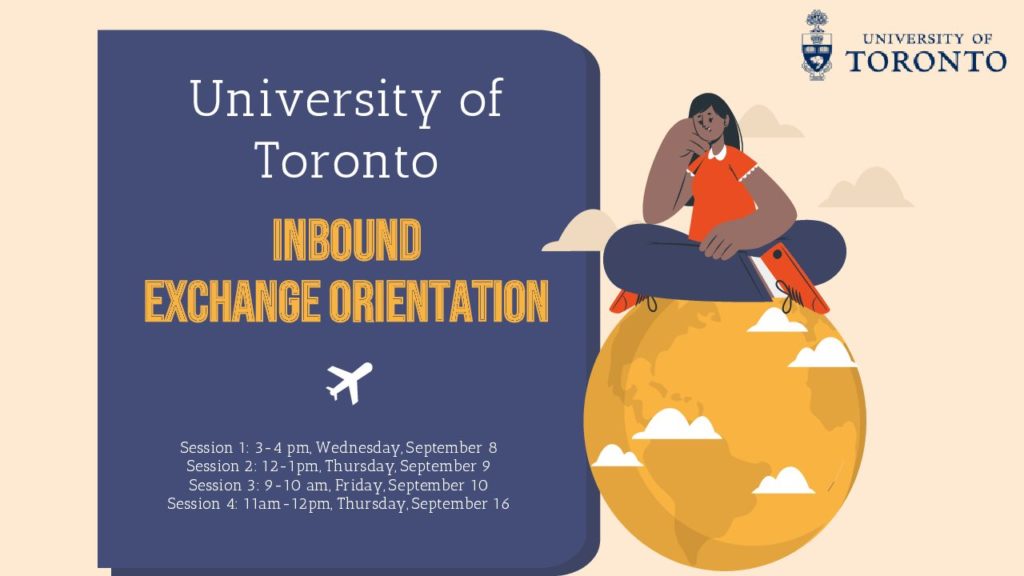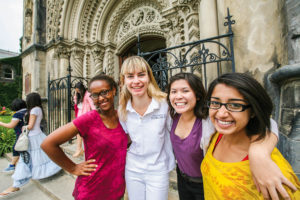Course Enrolment and Campus Resources
The information below pertains to exchange students coming to U of T through the exchange program hosted by Centre for International Experience (CIE). It is not intended for degree-seeking international students, transfer students, or students from any other program at U of T.

Beginning and Ending Your Exchange
Pre-Arrival Guide
The steps described here and in the Admitted Students Pre-Arrival Guide must be completed before your arrival in Toronto. Be sure to stay up-to-date on the University’s policies around COVID 19 through the Office of the Vice Provost. Check back frequently for the most current information.
End of Term Guidance
After You Arrive at U of T
Upon arrival, be sure to complete the following steps.
Due to the COVID-19 pandemic, the Government of Canada requires that all students must quarantine upon arrival into Canada. For full information about this, please visit the Information on Quarantine Accommodations section on the COVID-19 Information for U of T Students page.
PLEASE NOTE: Exchange students are not eligible for the U of T Undergraduate Emergency Grant or the School of Graduate Studies Emergency Grant.
There are a few different ways to get to U of T from the airport depending on your campus. Public transit (TTC) is the cheapest option at around $3.00 per trip (prices change often, so check the TTC website for updated information).
Your TCard identifies you as a U of T student. To get your TCard, follow the instructions on the How to Get Your First TCard page. You will need to provide the following documents to obtain your TCard:
- Passport
- Study permit
- A copy of your admission letter
Once you obtain your TCard, your JoinID becomes your UTORid. You will also receive a Secret Activation Key (SAK) to activate your UTORid and your mail.utoronto.ca email account. Your UTORid allows you to sign in on many university systems, including campus wifi.
If you need any help with your UTORid, email account, or Secret Activation Key (SAK), contact the Information Commons Help Desk.
If you do not have active Ontario Health Insurance Plan (OHIP) coverage (or coverage from another Canadian province), you are required to purchase the University Health Insurance Plan (UHIP) while studying at U of T.
UHIP (mandatory)
UHIP is a health insurance plan for all exchange and international students enrolled in an Ontario university. It helps to cover the cost of medical services, such as hospital and doctor visits, should you become ill while on exchange. Please familiarize yourself with your UHIP plan coverage as most dental care, prescription drugs, eye care, and various kinds of therapies are not covered by UHIP.
Exchange students are NOT eligible for U of T supplementary insurance plans. For additional coverage, we recommend that you purchase travel health insurance before you arrive.
Cost
In 2021/2022, UHIP fees are $63 per month. This rate is subject to change for upcoming years.
Example: If you are on exchange for either the fall or winter term, your UHIP fees will be $252 ($63 x 4 months).
When you first log in to ACORN to view your fees, you may notice that you have been charged for 12 months coverage. This is because fees are automatically calculated for the full calendar year. These fees will be adjusted to match the amount of time you will be studying at U of T. Do not pay the fee until it has been adjusted.
Print card
You will need to show your UHIP card and fill out a claim form every time you use health care services, so be sure to register online, print your card and carry it with you at all times. (Claim forms are not required at the U of T Health and Wellness Centre).
Make the payment
Payment is due by the end of the first month that you are at U of T. You can refer to the payment options on the Student Accounts website.
The coordinator of each campus will send more information about these sessions by email.
Inbound Orientation Recording
Winter 2022
Inbound Orientation Presentation Slides
Winter 2022

Course Enrolment Information
2021-2022 Course Enrolment Guide (Round 5) Explains the course enrolment process for S 2022 classes.
List of restricted courses for engineering students List of courses in Arts and Sciences that engineering students may not participate in.
Course Drop Form Instructions and form for dropping a course you are already enrolled in.
The last day to drop Y courses: February 17, 2022, 9:00 AM
The last day to drop S courses: March 10, 2022, 9:00 AM
Course Request Form Application to request a course and drop a course concurrently. Round 5 of Course Enrolment will be open January 4th at 10:00 AM to January 17th at 10:00 AM.
Who to Contact Regarding Your Timetable/Course Enrolment:
Undergraduate Studies
- Faculty of Arts & Science: inbound.exchange@utoronto.ca
- Faculty of Applied Science & Engineering: visitingstudent@engineering.utoronto.ca
Graduate Studies
- Faculty of Law: records.law@utoronto.ca
- Faculty of Information: sherry.lin@utoronto.ca
For all other programs or faculties contact the administrator in your unit or department.
University of Toronto Academic Resources
Academic Integrity Learn what constitutes academic integrity at the University of Toronto and what your professors will expect of you.
Academic Success Resources about academic expectations and tutoring options.
Academic Services & Support
Learning Strategists: Connect with a learning strategist for individualized support in meeting your academic goals.
Academic Success Peer Tutors: Book an appointment with an Academic Success peer mentor to get fast support with academic strategies and goal setting.
Writing Centers: Meet individually with a trained instructor to develop your ability to plan, organize, write, and revise academic papers in any subject.
Understanding Reading Week
Academic Technology
Ask Chat with a Librarian: Get help finding specific publications or learning about the different resources available through U of T’s library system.
Exam Tips
Campus Resources
UHIP Office Website for all questions and concerns relating to the University Health Insurance Plan.
ACORN Website to view your class schedule and grades.
CLNx Portal to find campus events and opportunities. You can also make an appointment with the Inbound Team through this link.
Academic Integrity Learn what constitutes academic integrity at the University of Toronto and what your professors will expect of you.
Academic Success Resources about academic expectations and tutoring options.
Health and Wellness Exchange students are eligible to participate in health and wellness programming and appointments.
Facebook Group Connect with other UofT Exchange Students.
International Language Exchange Program Speak with other students in your native language and help other students learn your language.
Hart House UofT’s centre for experiential education outside the classroom.
There are many opportunities for programs and making connections at the University of Toronto through the Centre for International Experience. The International Student Experience team offers great resources and opportunities. Sign up for their newsletter to stay up to date on their latest offerings, visit the CIE events calendar on CLNx, or check out the recurring programs linked below.

Intercultural Learning Program
The Intercultural Learning Program is a way to build your intercultural skills at home or abroad. Learn more about Intercultural Learning Program
International Language Exchange
Bonjour U of T! Te gusta estudiar lenguas? This is your chance to practice or learn the basics of a new language, while helping other students do the same in regular weekly meetings! Learn more about International Language Exchange
International Student Experience Ambassador Program
Incoming international students can get as many questions answered as possible before arriving at U of T. Learn more about International Student Experience Ambassador Program
Life In Toronto
Toronto and the GTA: Learn more about the city, its history and culture.
Our 3 Campuses: To the west, the University of Toronto Mississauga (UTM) combines advanced research with an intimate academic experience. The University of Toronto’s St. George campus features diverse college communities within Toronto’s vibrant downtown core. And to the east, the University of Toronto Scarborough (UTSC) leads community-engaged research, hands-on learning and co-op programs both locally and internationally.
Getting Around the City and GTA: You’ll find many ways of getting around in Toronto and the GTA, with its interconnected bus routes, subways, streetcar lines, GO trains, bike trails, walking paths and a campus-to-campus shuttle. All campuses have well-lit walking paths linking buildings, and provide various accessible transportation options.
Things to do in Toronto: Explore a city full of art, culture, sports, music and much more.
Climate and Weather: Toronto has a semi-continental climate, with a warm, humid summer and a cold winter. Although Toronto is one of Canada’s warmer cities in winter, winters are still severe, with snow on the ground most days between mid-December and mid-March. Snow deeper than 1 cm is seen on 65 days a year on average.